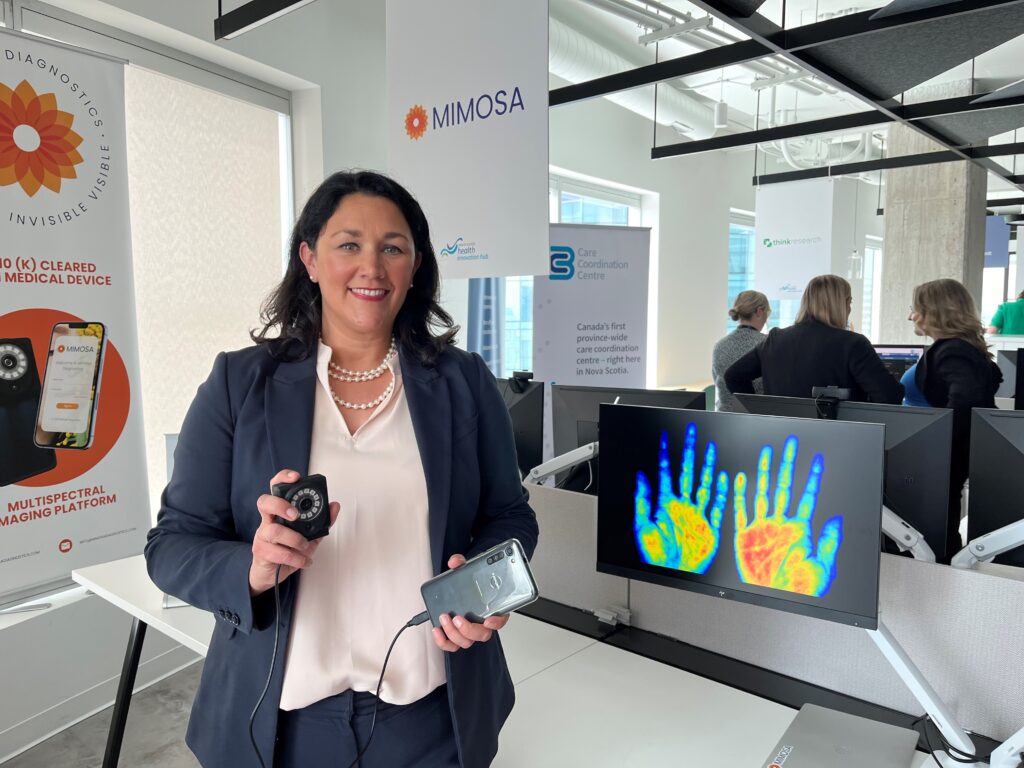MIMOSA Diagnostics’ portable imaging device is saving limbs and lives

MIMOSA Diagnostics is on a mission to make skin health assessments more equitable and easier to access.
The startup has created a pocket-sized imaging device that assesses skin injuries with the goal of identifying early opportunities for intervention and preventing the loss of limbs or life.
The early intervention and ease of access hits home with MIMOSA founder and CEO Dr. Karen Cross. Her grandfather passed away after developing a tiny wound at the tip of his toe while living in rural Newfoundland. With limited access to care in the area, Dr. Cross’ grandfather lost his limb due to the injury and eventually his life. A doctor and expert in wound care, Dr. Cross knew there had to be a better way to ensure people like her grandfather get the care they need, when they need it. That is what inspired the creation of MIMOSA Diagnostics.
According to MIMOSA, there are over 10 million families affected by skin injuries every year with that number rising to 500 million globally. Rather than requiring an expert clinician to detect skin injuries, MIMOSA’s portable device can help more doctors and nurses with the data needed to make those same assessments.
Instead of requiring traditional 14 foot tall, 200-pound scanning machines, the MIMOSA Pro allows for assessments right at the point of care. The MIMOSA Pro allows clinicians to identify early opportunities for intervention by allowing them to see physiological biomarkers that are present below the skin’s surface and typically aren’t visible to the naked eye. The images captured are then uploaded to a HIPAA-compliant web portal where clinicians can track patient progress over time.
The idea of early intervention is to improve patient outcomes, save limbs, and lives while also saving the healthcare system money.
Another way that MIMOSA is working to improve care equity is by ensuring their technology has considered every patient. Handheld wound imaging devices are becoming more popular, but MIMOSA argues that light-based optical technologies used for detection have traditionally failed to account for darker skin tones. Meaning that those types of technology are less effective on non-Caucasians. MIMOSA is working to address this through the development of its own algorithms to account for skin melanin content.
MIMOSA uses machine learning to extract wound images, which is something OCI is proud to support the startup with through the Collaborate 2 Commercialize (C2C) program. In addition to supporting machine learning efforts through C2C, MIMOSA was also one of the early recipients of investment funding through the Life Sciences Innovation Fund (LSIF) to support the commercialization of its device, among other initiatives. Those commercialization efforts include marketing and distributing the MIMOSA Pro into the United States.
This past year was an important one for MIMOSA as the startup was able to see its work come to fruition with the MIMOSA Pro used in clinical settings with early surgeon and clinician partners.
Alicia Pereira,
Director, Communications & Strategy
Media essentials including backgrounders, logos, photos and links to OCI publications.
Stay up-to-date with the latest OCI news and events right in your inbox!




